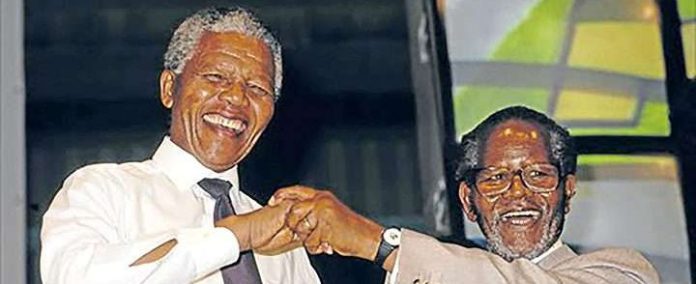Oliver Reginald Tambo and Nelson Mandela were like two peas in a pod, their friendship a blazing fire that warmed the hearts of all who witnessed it.
It is our sacred duty to preserve this extraordinary bond, like a precious gem passed down through the ages so that future generations can bask in its brilliance and find inspiration in its unwavering strength.
Their journey began in their youthful days as students when they first crossed paths and discovered a shared passion for justice and equality. Their bond grew stronger, leading them to embark on a remarkable partnership by establishing a law firm. Together, they fought tirelessly against the injustices that plagued our country. Mandela and Tambo were unjustly persecuted, their voices temporarily silenced, but their spirits remained unbroken. Even behind bars, Mandela continued to inspire hope. Exile became Tambo’s reality, as he was forced to leave his beloved country behind.
More importantly, prison and exile could not destroy their brotherly bond.
Speaking at the unveiling of Tambo’s tombstone in April 1998, Mandela said: “Though exile and imprisonment kept us apart for many years, Oliver was never far from my thoughts. I would also think of how Tambo would handle things; such was his strength as a strategist.”
I felt it was fitting to commemorate Mandela Day by engaging in the cleaning and tree-planting efforts at OR Tambo House in Zambia. Additionally, we initiated a project aimed at revitalising the house, turning it into a prominent tourist destination and a hub for diverse socio-economic endeavours.
During my first visit to the house, I had the privilege of being accompanied by the late Mbulelo Musi, also known as Moss Thema (MK name), and his friend, George Twala, who currently serves as the South African High Commissioner to Zambia. They shared with me the fascinating story of how they used to pass by this very house without realising it was the residence of “President OR Tambo”.
It was only after our liberation that they discovered this fact. Despite being friends and foot soldiers with OR Tambo’s guards, they were never informed of his whereabouts. This was due to the high level of secrecy surrounding Tambo’s address. He was one of the most wanted individuals by the South African authorities.
The collaboration between the South African High Commission in Lusaka, Zambian National Heritage Conservation Commission, Eco City Trust, and South African companies operating in Zambia was a resounding success. The launch of the Restore OR Tambo house in Lusaka on Mandela Day not only achieved its objective but also provided an opportunity to assess the state of
other South African heritage assets in Zambia, currently at risk of being lost if not properly conserved.
One such concern is the scattered graves of South Africans who lost their lives in Zambia during the struggle days. Regrettably, some of these graveyards are not adequately maintained.
While some notable individuals, such as Moses Mabhida, Kholeka Tunyiswa, Joe Gqabi, Ruth First and have been repatriated, it is worth mentioning that President Cyril Ramaphosa in 2020 announced the repatriation of the late secretary-general Duma Nokwe and women section president Florence Mophosho during the state of the nation address.
However, three years have passed since this announcement, and the repatriation has yet to take place.
One potential solution could be to create a monument park, like the Tazara Memorial Park in Lusaka, Zambia, which was established by the Chinese to honour the 36 Chinese engineers and workers who died during the construction of the railway line connecting Zambia and Tanzania in the 1970s and 1980s.
China is a prominent player in the global economy, and as fellow members of Brics, we have a long-standing and deep relationship with them. Leveraging this relationship, we can seek their assistance in constructing our own monument in Zambia, which could become a significant tourist attraction and contribute to the realisation of the broader African struggle liberation route.
Recognising the complexity and sensitivity of such a project, it is unlikely that the government and its agencies alone can effectively manage all the dynamics. Therefore, it is crucial to involve independent organisations like Eco City Trust, civil society groups, businesses, and the media.
- Baloyi is an independent writer and executive director of Eco City Trust, an organisation that focuses on the Conservation of Environment and Heritage
Follow @SundayWorldZA on Twitter and @sundayworldza on Instagram, or like our Facebook Page, Sunday World, by clicking here for the latest breaking news in South Africa.



